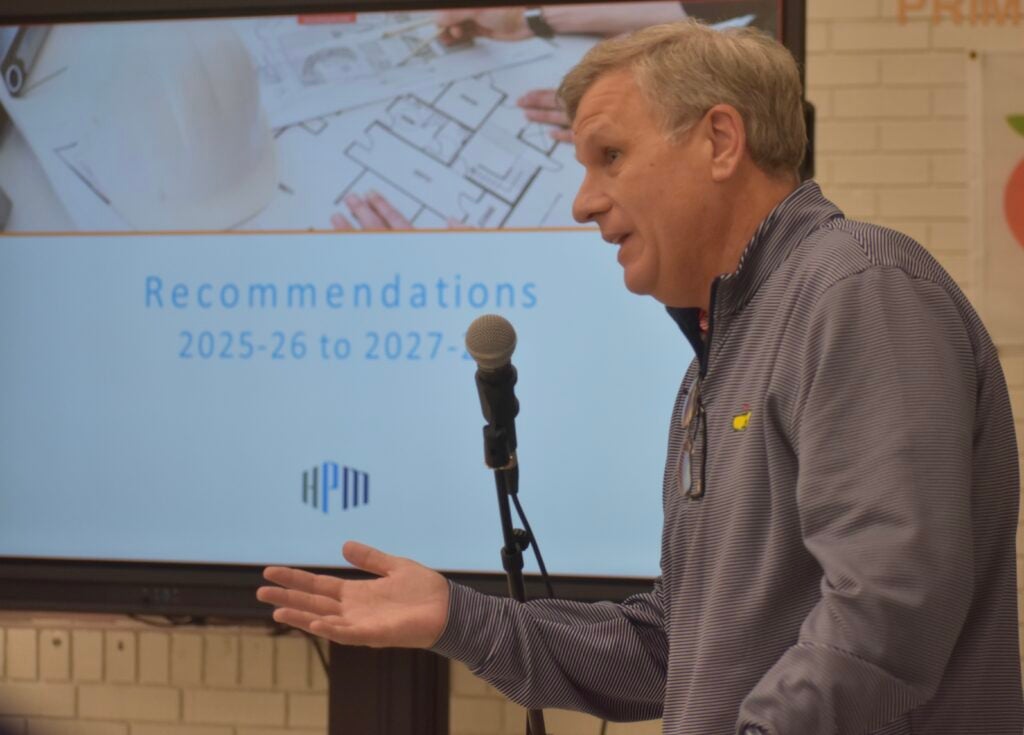Richmond County parents, grandparents and community members voiced many concerns about the school system’s proposed plan at the first informational meeting on Monday night, March 4, at A. Brian Merry Elementary School.
After recently releasing a Comprehensive Facilities Plan by HPM, which outlines intentions to build and consolidate schools, Richmond County held its first feedback meeting in which several families expressed concern regarding effects on staff and learning outcomes.
Within the proposed plan suggested changes would be implemented over this year until 2028, and involve a significant shifting of students, staff and programs that will affect various high, middle and elementary schools.
If approved by the county’s Board of Education, the plan’s more immediate adjustments for the 2024-25 school year would result in the current Richmond Hill K-8 and Belair K-8 school being turned into a consecutive new elementary and middle school, as well as a rebuild of Langford Middle School which would cause students to be reassigned to Tutt Middle.
Other changes would also result in the closure of A. Brian Merry Elementary School, Spirit Creek Middle School and Tutt Middle School.
MORE: Augusta qualifying draws newcomers, incumbents
From collecting and analyzing demographic and attendance data, HPM’s Vice President of Planning Services Tracy Richter said – if the Richmond County School System wants “robust” programs with low operating costs – small school enrollments would have to be eliminated.
As 16 out of RCSS’ 28 elementary schools, 6 out of 8 middle schools, and 4 out of 8 high schools are currently below enrollment needed for minimum program state funding, Richter believes his team’s strategy would allow the county to gain more state funding and operate more efficiently to increase students’ quality of learning.

“That’s an investment strategy, as you move forward, in order to make sure that you have state-of-the-art facilities where kids are and where they’re going to be,” he said. “Not where they have been. I think that’s an important thing.”
However, Richter said such long term goals for improvement cannot be achieved without some community sacrifice.
“I think that you have opportunity in this district, because you have so much space, to create a really great opportunity for kids,” he said. “And there are some neighborhoods that are going to have to step up for the rest of the district – we happen to be standing in one of those schools tonight. And I’m going to ask the same thing of Josey and of Glenn Hills, and of Spirit Creek down the road.”
Following Richter’s explanation and breakdown of the Comprehensive Facilities Plan, attendees were invited to participate in a Q&A session and took turns passionately criticizing HPM’s school system proposal.
With a packed cafeteria and overflowing parking lot, several individuals said Richter’s plan was illogical and unfairly favored some schools over others.
“The way that this has been presented, it’s almost as if they want to punish the magnet schools,” said attending C.T. Walker mother Heather Murphrey. “I mean none of the meetings are geared towards magnet schools, and over 50% of these questions tonight had to do with them.”
Although attendee Felicia Murray, a fellow mother, said she understood the plan’s strategy to ensure additional funding and attendance, she largely does not believe Richter’s plan can guarantee both issues are solved throughout the county.
“This conversation that I’m listening to sounds more quantitative and not qualitative, and I think what’s missing is research from the teachers, who are all going to be dispersed between the different schools,” she said.

Worried about losing “quality teachers,” Murray also said she thinks the facilities plan will not ensure higher student attendance or learning.
“I think we’re talking about treating the symptoms, but we’re not really talking about the root of the problem,” she said. “ … I’m passionate about learning. I graduated from Davidson Magnet School, and I’m saddened to hear the fact that they’re not even performing at the level they once were when I was in school.”
To Jennifer Monroe, a mother with a student at A.R. Johnson Magnet School, the plan’s 2025-26 goal of moving A.R. Johnson students and teachers to the Richmond County Technical Career Magnet School campus caused her and other parents great anxiety regarding the program’s future.
“When they move over to RCTCM, since A.R. Johnson is a health career pathway, why would they be moving away from the medical district?” Monroe said.
In response, Richter said A.R. Johnson, because students’ residences range greatly in distance and the nation is trying to address staffing shortages, students struggle almost daily with getting to class on-time.
“We’re trying to get them to a more accessible sight,” Richter said. “… but the access to the hospital will still be there.”
Alettia Rucker, a meeting attendee and C.T. Walker Magnet School parent, said she felt the facilities plan largely benefitted the other schools, but unnecessarily disrupted C.T. Walker students by displacing them into a new building that would be shared with another school.
“I just felt like [the plan] didn’t even touch on C.T. Walker. We were an afterthought,” Rucker. “We are a nationally known program, nationally ranked, and yet we weren’t even considered … so I just felt very disappointed as a parent.”

Murphey, said she believed the informational meetings did not occur soon enough and, like herself, community members have shown concern over whether input will actually be applied and considered.
“They are talking about closing [A. Brian Merry Elementary School].This is something that should’ve been discussed long before March,” said Murphey. “A lot of it just doesn’t make sense. I don’t get it and I feel like a lot of this is being harped on for middle school and high school while elementary schools are just getting the short end of the stick for it.”
Claiming that closing and consolidating schools will only harm younger students, Murphrey said she worried that elementary schoolers would be at risk for receiving a poorer education, and thus be more likely to drop out of school in later years.
“Unfortunately, you’re going to have way more students not make it to the end than when they start,” she said. “So, why not cut them off in the beginning and not give them their best chances?”
Despite facing multiple criticism and harsh questions from Richmond County parents and residents, Richter said he was glad to converse with many attendees and receive feedback on the proposal.

“I’d like the conversation in Richmond County to be ongoing, and I know that hasn’t happened in the past, but you got to start somewhere,” he said.
Following the meeting, Richmond County Board of Education President Charlie Walker said he was thrilled to see many parents attend and participate within the meeting.
“I was very impressed that as many people showed up as they did. There is a passion for it,” he said. “We saw evidence of that tonight, and I like that we focused on more than just primary schools. We had people who were asking high and middle school questions as well.”
For the next five informational meetings, Walker said he hopes the community will continue to attend, engage and be a part of the county’s conversation regarding the facilities plan.
Next informational meeting will take place the evening of March 5 at Hephzibah’s Spirit Creek Middle School, located at 115 Dolphin Way, starting at 6 p.m.
For more information about the Comprehensive Facilities Plan and other future informational sessions, visit: https://www.rcboe.org/cms/lib/GA01903614/Centricity/Domain/15585/RCBOE_DRAFT_RECS_03012024%202024-03-04%2020_17_49.pdf or https://www.rcboe.org/planning













